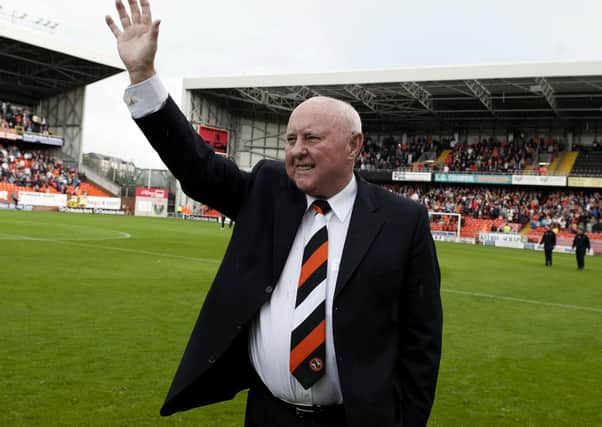Alan Pattullo: Jim McLean takes centre stage in poignant play


The show opened with the former Dundee United manager, who’s played by the excellent Barrie Hunter in a two-hander with the equally impressive Chris Alexander, delivering the mother of all dressing downs to his players after a match. Of course, the punchline is that United had in fact won 5-0. The current Rangers players would not know what’s hit them were McLean in situ at Ibrox, which he once might have been.
Loyalty to United and recognition that his family were happily settled in Broughty Ferry persuaded him to stay. The club were his life.
Advertisement
Hide AdAdvertisement
Hide AdSo, when the McLean character turns and asks, “how are the team doing?” it’s one of the most poignant moments in a deeply moving play, written by Phil Differ. Even before McLean’s current struggles with dementia, his association with United had been broken somewhat. But this production and the unveiling of a statue outside Tannadice in May will help redress this.
“What’s this statue to be made of?” asks McLean. “Blood, sweat and tears?” It was once said that McLean was a joiner from Larkhall who thought he was a carpenter from Nazareth. But that’s inaccurate because he suffered from the opposite of a God complex; he never, ever thought he was good enough. Quite the opposite in fact.
He was forever trying to prove himself, push the limits of the corner shop club against the supermarkets. There were plenty of casualties. At one point McLean delivers a sad admission that he was a poor father to his two sons.
The stage set is exceptional. A broken door handle is a central motif. Fragments of tenement building stretch towards the roof. A ladder leans against a wall. There are sheets draped over a chair in what might be an approximation of a joiner’s workshop or the insides of a confused mind.
An old radio flickers into life to broadcast a report of United’s title win at Dens Park. Steps lead up to a gantry – maybe a press box?
The media, of course, were his bete noire, even playing a part in his ultimate downfall. The play deals with this episode early on. McLean, then chairman, is interviewed after a defeat by Hearts in October 2000 and the muffled sound off camera is him striking John Barnes after a fair question from the reporter regarding then manager Alex Smith’s future.
The McLean character comes to realise the media were not his main enemy. Rather, it is the march of time. A new breed of player, untameable in some cases, saw McLean’s powers wane. Which of his many brilliant players features most in a brisk play that sees the final whistle blown at just under the hour mark? Paul Sturrock, Eamonn Bannon, Davie Narey? No, it’s Duncan Ferguson, who McLean despaired at because football, it seemed, was not his be all and end all.
Every time Ferguson’s name is mentioned, a crow squawks ominously.
Advertisement
Hide AdAdvertisement
Hide AdMcLean accepts his football obsession is a form of madness. “The black addiction of the brain”, is how Bertolt Brecht termed such an overwhelming desire to win. McLean even has a tantrum when losing a game of cards with his wife, Doris.
The play’s run ends tonight. While McLean himself stayed put at United, for better or worse in terms of his own ambitions, this production surely merits a transfer to places elsewhere.
Comments
Want to join the conversation? Please or to comment on this article.